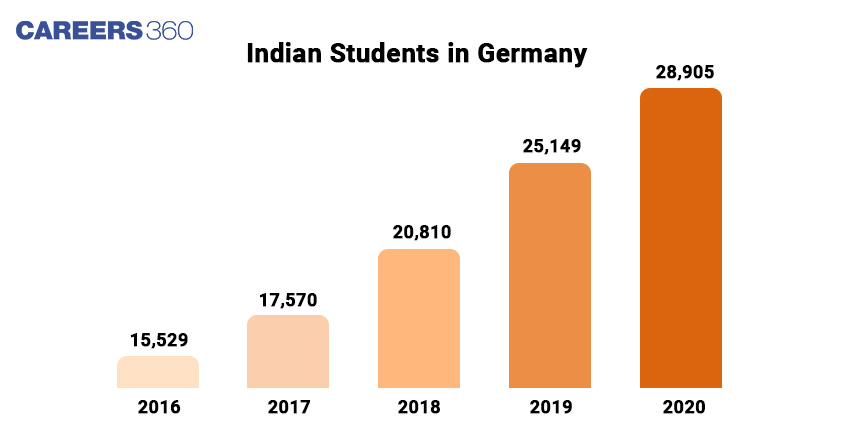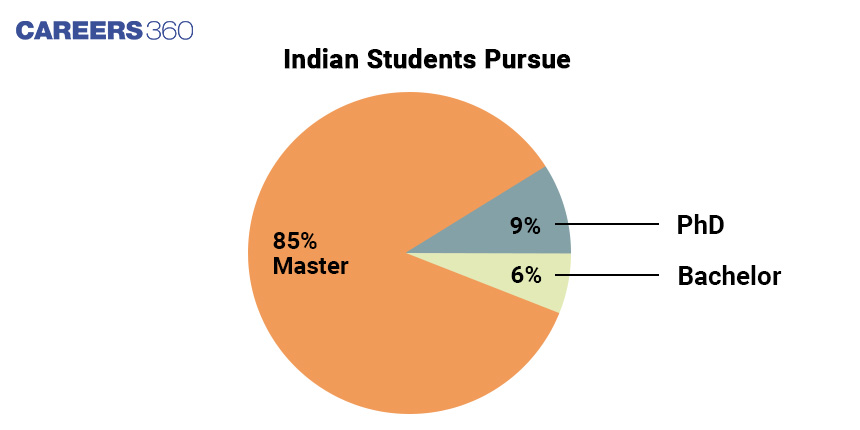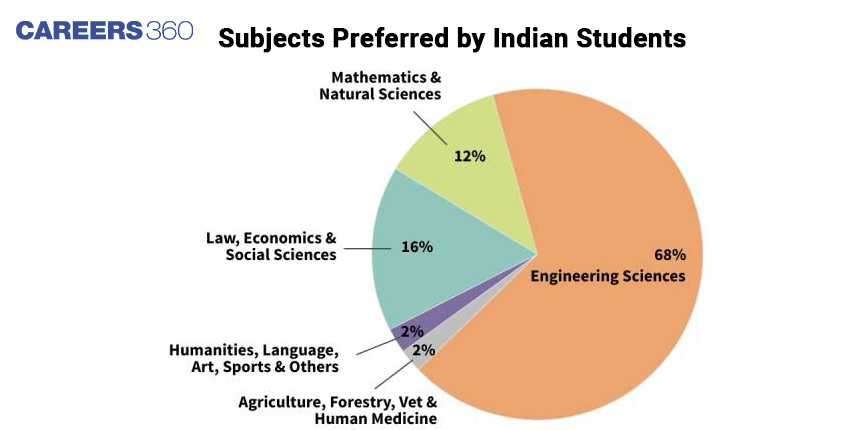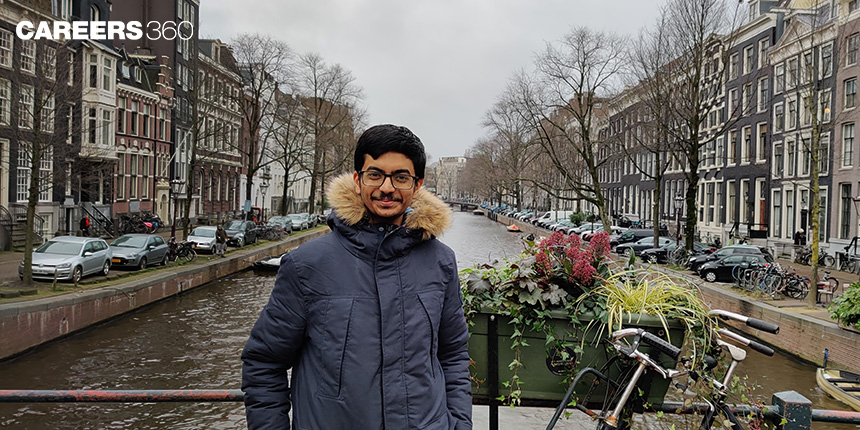Why Study In Germany, Which Courses To Pursue
Germany is a great destination for higher education abroad. Top-notch universities offer excellent study programmes and numerous study options are available in English language. A degree from a German university opens career opportunities not only in Germany but all over the world. Germany has remained attractive for students even against the background of the corona crisis. Significantly, more international students are aiming to complete their entire degrees at German universities today than before corona.

International Students In Germany
German universities have recorded an increase of over 80% in international student numbers from 2010. Around 4,00,000 international students attended German universities as of 2021, representing an increase of 5.6% compared to the previous year. Despite the pandemic, the interest of international applicants in studying in Germany remains uninterrupted.
Indian Students In Germany
German Ambassador to India, Walter J. Lindner, told Careers360 that “doors are open to many more excellent students from India.”
“German universities offer some of the best courses in the world, with renowned faculties across all disciplines. Germany is a perfect fit for outstanding Indian students with its academic excellence, vibrant university cities, and great career perspectives in Germany and back in India. I am proud that we have almost 30,000 Indian students in Germany. The doors are open to many more excellent students from India,” ambassador Lindner said.
 German Ambassador To India: Walter. J. Lindner (Picture Courtesy: DAAD)
German Ambassador To India: Walter. J. Lindner (Picture Courtesy: DAAD)
The number of Indian students in Germany continues to be on the rise. It has grown by almost 15% over the last year and stands at 28,905 for the winter semester 2020-21. Of these 72% are male students and 28% female. The rate of growth in the number of Indian students going to Germany is close to five times that of the global average, with Indians forming the second-largest group of international students enrolled at German universities.
GFX: Indian Students In Germany
 Picture Courtesy: DAAD
Picture Courtesy: DAAD
The largest number of Indian students going to Germany aim at a Master’s degree. This is followed by PhD and Bachelor aspirants.
GFX: What Indian Students Pursue in Germany
 Picture Courtesy: DAAD
Picture Courtesy: DAAD
Subjects Preferred By Indian Students
The largest number of Indian students joined German universities to study engineering (66%) followed by management and social studies (16%), mathematics and natural sciences (12%). Of these, 63% chose universities or technical universities (TU) and the remaining 37% enrolled themselves at universities of applied sciences (HAW/FH).
 Picture Courtesy: DAAD
Picture Courtesy: DAAD
Deepak, an Indian student who completed his master's from IIT Bombay, wanted to pursue research in Bioscience, especially in the field of structural biology. So, he got admission to Ludwig Maximilian University of Munich (LMU Munich). Deepak (who goes by one name) said that doing PhD at LMU Munich helped him to connect with scientists in Germany and across the globe.
“Studying in Germany for doctoral research helped me, majorly in collaborating with scientists, not just from Europe but across the globe. German universities provide a highly international and diverse research environment for the overall development of my research temperament,” Deepak said.
“Being a DAAD PhD scholar, I participated in multiple conferences, symposiums, and seminars across Germany and Europe. These conferences turned out to be a great source of networking as I found my current research collaborator through one such forum,” he added.
 Deepak, PhD Scholar, Ludwig Maximilian University of Munich (Picture Courtesy: DAAD)
Deepak, PhD Scholar, Ludwig Maximilian University of Munich (Picture Courtesy: DAAD)
Germany’s reputation as a high-tech nation with expert education has long been an important factor for students in choosing Germany over other destinations. A large number of Indian students enrol in the fields of Engineering, Natural Sciences and Mathematics. Over 12 German universities figure in the top 200 of QS rankings, and an impressive number of universities host Nobel laureates among their faculty.
Besides the traditional branches of Engineering and Science, fields such as Environmental Engineering, Engineering coupled with management and other interdisciplinary fields are becoming increasingly popular amongst Indian students. Humanities and Social Sciences have traditionally been Germany’s strongholds, and Indians as well as other international students are increasingly choosing the country as the destination for PhDs and post-doctoral studies.
Scholarships, Money Matters, Part-Time Jobs
Germany offers excellent scholarships at the PhD level and above. The DAAD PhD and Sandwich model scholarships have always been popular amongst students, and there are many other schemes available as well.
According to DAAD Information Centre, “Within the Sandwich Scheme, PhD students carry out their research and studies alternately in their home country and in Germany, following a schedule set in advance and under continuous supervision by a German academic. The doctorate is obtained at the homeland university.”
The number of scholarships targeting Master students is relatively few, but a large number of German universities practice a low/no tuition fee policy.
The average living costs for a student in Germany are 860 Euros per month. These vary depending upon the city and lifestyle of the individual. As a registered student at any level i.e. Bachelors, Masters or PhD, one is legally allowed to work part-time for 120 full days or 240 half days in a year.
After completing a degree in Germany, students may stay on in the country for up to 18 months to look for a job. And after they find a job, this limited residence permit is converted to a residence permit for employment.
Career Opportunities, Internships
In Germany the exposure to work or job markets begins rather early, and special emphasis is given to teaching application-oriented knowledge. Faculty members at these universities have several years of relevant practical work experience in the industry. For example, universities of Applied Sciences place special emphasis on the teaching of application-oriented knowledge. And faculty members necessarily would have gained several years of relevant practical work experience in the industry.
In Germany, students are expected to carry out internships as a part of their studies. Internships are often looked upon as a way to assess potential employees by the industry. The exceptional industry exposure that students get while still pursuing their studies is seen as a tremendous value addition by the Indian student community. The industry-academia cooperation in Germany has been exemplary. Given this, universities have excellent job-market connections. The career centres at universities help students find employment.
German degrees enjoy worldwide recognition and India is no exception. There are job opportunities all over the world for those who have completed their studies in Germany. This includes, but is not limited to, the traditionally known sectors of engineering and management. Today, Indian researchers account for 7% of scientific staff in German universities.
Paresh Yeole, an Indian student who studied master's at RWTH Aachen University, vouches for a German degree’s acceptability in other countries. “Doing masters at RWTH Aachen was already an international experience. My stay in Germany not only prepared me technically for my career but also gave me exposure to work in teams with people from diverse cultural backgrounds and nationalities. I moved to Austria after my master's for a job. And since Austria is also a German-speaking nation, I did not face any difficulties adjusting here. In short, my masters journey prepared me professionally for working in an international environment.”
 Paresh Yeole, Austria. Alumnus, RWTH Aachen University (Picture Courtesy: DAAD)
Paresh Yeole, Austria. Alumnus, RWTH Aachen University (Picture Courtesy: DAAD)
Dr Roopam Shukla from India who did research at the Postdam Institute for Climate Impact, or PIK Germany, a government-funded research institute, is now a faculty member at Indian Institute to Technology Roorkee. She said her post-doctoral experience in PIK helped her a lot in getting the appointment.
“I experienced an open, respectful and independent working environment at PIK, Germany. I was provided with excellent resources and a high level of autonomy to carry out my research along with the supportive working conditions. This conducive environment shaped my deep appreciation towards my colleagues, in particular, and the German research system in general. My postdoc experience at PIK of writing research papers, proposals and multitasking added immensely to my self-confidence, helping me to secure my appointment as a faculty member at the prestigious IIT Roorkee in India,” Dr Shukla said.
 Dr. Roopam Shukla, IIT Roorkee (Picture Courtesy: DAAD)
Dr. Roopam Shukla, IIT Roorkee (Picture Courtesy: DAAD)
The close economic cooperation between Germany and India has resulted in thousands of large German companies and SMEs having their establishments in India, which has created many job opportunities. Similarly, large Indian companies are investing heavily in Germany and creating thousands of qualified jobs. Those with a German academic background have excellent prospects, given their exposure to both India as well as Germany.
“Choosing Germany for my master’s was one of the best decisions of my life. Great research infrastructure, international collaborations, different funding opportunities, guidance from my supervisors and from different collaborative working groups makes your research more effective and innovative. After graduating in Zoology from Hansraj College, University of Delhi, I pursued my masters in Biochemistry from the University of Bonn, which helped me focus more on practical knowledge, giving me the freedom to work on my ideas. In addition, there are different platforms to apply for start-ups, enabling me to gain life-changing experience in this country, the world leader of technology and advancement,” said Rishabh Jain.
 Rishabh Jain, Alumnus, University of Bonn (Picture Courtesy: DAAD)
Rishabh Jain, Alumnus, University of Bonn (Picture Courtesy: DAAD)
Language And Culture
Language is no longer a barrier for higher education in Germany with over 2000 International Programmes being offered in English medium. English is the largely accepted language for research as well. Knowing the German language, however, helps students in integrating into the cultural fabric of the country and certainly gives them leverage when it comes to pursuing a career, especially in the German industry.
All the information and guidance for students aspiring to study in Germany is available at no charge with the DAAD – German Academic Exchange Service with its offices located in New Delhi, Bangalore, Chennai, and Pune. Regular online information sessions are offered every month and online appointments are also available. Further information is available on www.daad.in.
Applications for Admissions are open.
Apply for UG & PG programs from Victoria University, Delhi NCR Campus
Study in Ireland
ApplyWant to study in Ireland? Explore Universities & Courses
Study in Canada
ApplyExplore Universities, Courses & Subjects | Work while study
Study in UK
ApplyApply for upcoming intake & plan your journey
Study in USA
ApplyUniversities inviting applications | Get expert guidance
Study in Australia
ApplyShortlist best ranked universities & get expert guidance